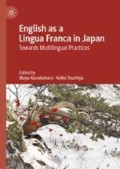Abstract
Professor Kumiko Murata and her colleagues have brought ELF research to ELT in Japan. Yet it is not easy to remove from the Japanese minds native-speakerism, the residue of the awe and adoration they felt to the advanced Western civilization when Japan opened doors to the world 150 years ago. The mindset is still extant while Japan has grown into the third economic world power. ELF research can help liberate the Japanese from this native-speakerism by informing that more than 80% of English users worldwide are “non-native speakers”, that the interactions occur in the multi-linguacultural settings, and that “non-native speakers” can contribute more to regularizing and generalizing English towards more efficient means of communication than native speakers who are not necessarily aware of how the language works. Japanese should use their own grammatically acceptable and communicatively efficient form of English, making use of their linguacultural repertoire rather than being copycats of native speakers.
Access this chapter
Tax calculation will be finalised at checkout
Purchases are for personal use only
References
Cook, G. (2003). Applied linguistics. Oxford: Oxford University Press.
Jenkins, J. (2007). English as a lingua franca: Attitude and identity. Oxford: Oxford University Press.
Jenkins, J. (2015). Global Englishes (3rd ed.). London: Routledge.
Kachru, Y., & Nelson, C. L. (2006). World Englishes in Asian contexts. Hong Kong: Hong Kong University Press.
Kirkpatrick, A. (2010). English as a lingua franca. Hong Kong: Hong Kong University Press.
Mauranen, A. (2012). Exploring ELF: Academic English shaped by non-native speakers. Cambridge: Cambridge University Press.
Murata, K. (Ed.). (2012–2018). WASEDA Working Papers in ELF (English as a lingua franca) (Vols. 1–8). Tokyo: Waseda ELF Research Group.
Murata, K. (2016a). Introduction: Researching ELF in academic and business contexts. In K. Murata (Ed.), Exploring ELF in Japanese academic and business contexts: Conceptualisation, research and pedagogic implications (pp. 1–13). London: Routledge.
Murata, K. (2016b). ELF research—Its impact on language education in Japan and East Asia. In M.-L. Pitzl & R. Osimk-Teasdale (Eds.), English as a lingua franca: Perspectives and prospects (pp. 77–86). Boston and Berlin: Walter de Gruyter.
Murata, K., & Jenkins, J. (2009). Introduction: Global Englishes from global perspectives. In K. Murata & J. Jenkins (Eds.), Global Englishes in Asian contexts current and future debates (pp. 1–13). New York: Palgrave Macmillan.
Seidlhofer, B. (2011). Understanding English as a lingua franca. Oxford: Oxford University Press.
Trudgill, P. (2002). Sociolinguistic variation and change. Edinburgh: Edinburgh University Press.
Yano, Y. (2001). World Englishes in 2000 and beyond. World Englishes, 20(2), 119–131.
Yano, Y. (2009). The future of English: Beyond the Kachruvian three circle model? In K. Murata & J. Jenkins (Eds.), Global Englishes in Asian contexts: Current and future debates (pp. 208–225). New York: Palgrave Macmillan.
Yano, Y. (2010). Culture-specific or culture-general? Cultural differences in English expressions. Philippine Journal of Linguistics, 41, 135–151.
Yano, Y. (2011). English as an international language and ‘Japanese English’. In P. Seargeant (Ed.), English in Japan in the era of globalization (pp. 125–142). New York: Palgrave Macmillan.
Yano, Y. (2013). Universal language change: Toward more regular and more general. Selected Papers from the Twenty-second International Symposium on English Teaching. Taipei: English Teachers’ Association-Republic of China, 110–120.
Yano, Y. (2018). Communication in English as a lingua franca: The Kachruvian model of three circles reconsidered. In E. L. Low & A. Pakir (Eds.), World Englishes: Rethinking paradigms (pp. 96–113). London and New York: Routledge.
Sources
Carvajal, D. (2007, August 1). For some Japanese, dream wedding means a trip west. International Herald Tribune, pp. 1, 6.
英語活動: ボランティアを先生に活用 [English activities: Using volunteers as a teacher]. 朝日新聞 [Asahi Shimbun], October 12, 2003, p. 6.
Fukuzawa, Y. (1885, March 16). 脱亜論 [Theory of leaving Asia]. 時事新報 [Current News], p. 1.
Ikezawa, N. (2018, May 2). 米国への異様な ‘隷属’: 主体的思想なき政府 [The abnormal ‘servitude’ to the United States of America: The Japanese government with no independent thought]. 朝日新聞 夕刊 [Asahi Shimbun, evening edition], p. 3.
METI. (2019). The specific service industry, ceremonial industry. Tokyo: 経済産業省 [Ministry of Economy, Trade and Industry]. Retrieved from http://www.meti.go.jp/statistics/tyo/tokusabizi/result-2/h29/pdf/h29report22.pdf.
Neeley, T. (2012, May). Global business speaks English: Why you need a language strategy now. Harvard Business Review, pp. 116–124.
Onishi, N. (2005, November 19). Ugly images of Asian rivals become best sellers in Japan. The New York Times, pp. A1, A6.
Takahashi, M. (2007, December 30). 教会? いえ, 結婚式場です [Is this a church? No, it’s a wedding hall]. 朝日新聞 [Asahi Shimbun], p. 21.
Author information
Authors and Affiliations
Corresponding author
Editor information
Editors and Affiliations
Rights and permissions
Copyright information
© 2020 The Author(s)
About this chapter
Cite this chapter
Yano, Y. (2020). ELF Research Can Liberate the Japanese from Native-Speakerism. In: Konakahara, M., Tsuchiya, K. (eds) English as a Lingua Franca in Japan. Palgrave Macmillan, Cham. https://doi.org/10.1007/978-3-030-33288-4_15
Download citation
DOI: https://doi.org/10.1007/978-3-030-33288-4_15
Published:
Publisher Name: Palgrave Macmillan, Cham
Print ISBN: 978-3-030-33287-7
Online ISBN: 978-3-030-33288-4
eBook Packages: Social SciencesSocial Sciences (R0)

